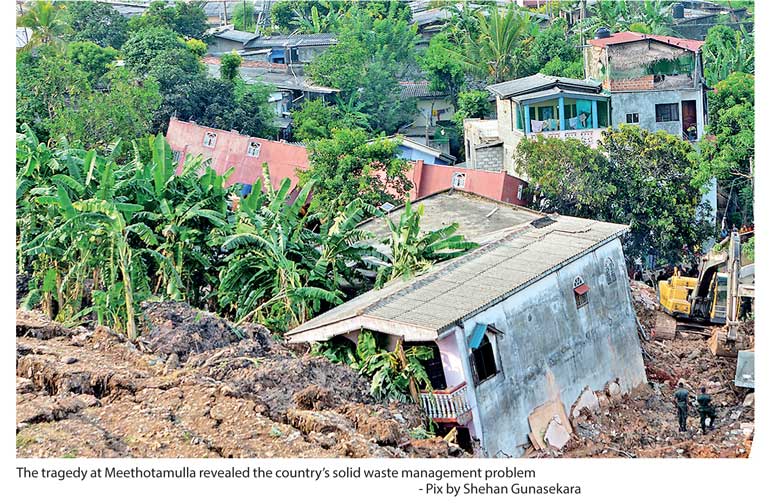Tuesday Feb 17, 2026
Tuesday Feb 17, 2026
Monday, 17 April 2017 00:04 - - {{hitsCtrl.values.hits}}
 Every time a foreign visitor has commented on how clean Colombo is, I have told them it was just a façade, that we had just moved the garbage out of sight to Meethotamulla and Karadiyana. But now the garbage is on the world’s TV screens. It took untold suffering, but Sri Lanka’s solid waste management problem can no longer be swept under the rug.
Every time a foreign visitor has commented on how clean Colombo is, I have told them it was just a façade, that we had just moved the garbage out of sight to Meethotamulla and Karadiyana. But now the garbage is on the world’s TV screens. It took untold suffering, but Sri Lanka’s solid waste management problem can no longer be swept under the rug.
Technological solutions, such as waste to energy, matter. But effective solutions have economic as well as technological components. Economic incentives are necessary to modify the behavior of actors throughout the garbage value chain. Since government resources are not unlimited and are deficient in promoting efficiency, attention must be paid to conditions for private investment.
Of course, a precondition is a political decision to give the highest priority to build efficient waste processing facilities, instead of endless and futile discussion about reducing waste or relying solely on recycling while mountains of garbage build up. The Meethotamulla deaths should shut down that idealistic nonsense once and for all.
Solid waste (SW) management requires major attention and investment. Use of complex contracts to outsource SWM activities to  private companies failed in the Colombo municipality. The contract was excessively complex; it was not monitored adequately (possibly because the capacity did not exist; possibly for other reasons); the private company claimed the municipality was delivering SW in a form different from that specified in the contract; the garbage piled up without adequate processing. Opponents of outsourcing obtained a court decision annulling the main contract. This unsuccessful foray into outsourcing may have caused more problems than it solved.
private companies failed in the Colombo municipality. The contract was excessively complex; it was not monitored adequately (possibly because the capacity did not exist; possibly for other reasons); the private company claimed the municipality was delivering SW in a form different from that specified in the contract; the garbage piled up without adequate processing. Opponents of outsourcing obtained a court decision annulling the main contract. This unsuccessful foray into outsourcing may have caused more problems than it solved.
The simpler dumping of contracts currently in use does not yield optimal results. The streets are clean but garbage mountains in different locations have grown with tragic consequences. Effective incentives are lackingfor reduction of waste and for source or site separation.
An effective solution would clarify roles and responsibilities of government entities and create incentives for private investment and efficiency. In light of institutional weaknesses within LGAs this would necessarily involve public-private partnerships (PPPs) and outsourcing.
The starting point would be a national policy on SW processing and disposal, setting out the desirable scale of SW processing facilities including the creation of incentives for efficiency and responsiveness to SW suppliers.
This must be done by the Central Government. Broad and deep consultation with the different levels of government and stakeholders is necessary to ensure buy-in for a stable, long-lasting policy. Ideally, the national policy will include an indicative schedule for imposing gradually increasing standards on the composition of SW that will be accepted by the processing facilities (biodegradable v. non-biodegradable; separation of hazardous material, etc.). Prices can be set by competition.
The SW processing facilities/landfills require significant investment. They may be fully outsourced to private companies but based on experience it appears that PPPs would be a better solution, both because the contracts with SW suppliers may be excessively complex and because public resistance to the location and operation of SW facilities is difficult to manage.
It is absolutely critical that no free dumping is allowed. It is only when LGAs, who comprise the majority of SW suppliers, have to pay by volume and have to pay more for unsorted garbage that incentives will be created downstream for source and site separation and for reduction of waste production.
Even if public funds are used to build the SW processing facilities (be they landfills, composting plants or waste-to-energy facilities), no free or subsidised services should be provided. Free or subsidised garbage disposal will be inimical to reduction of waste production.
Ideally, LGAs will pass on the costs of disposal to households and other producers of garbage. Incentives will be created to reduce, compact, sort, etc.
Each provincial government, through its CLG (in the case of the Western Province theWaste Management Authority), should make a determination on assigning LGAs to one or more SW processing facility in a manner compliant with the national policy. Ideally, the institutional design should not lock in LGAs to specific SW processing facilities, allowing forcompetition at the margin among facilities. There should be an obligation to deliver, say, 60% of a LGA’s SW to the assigned facility, but not 100%. The minimum commitment will provide the necessary certainty for the design of the facility and for investment. However, the possibility that the remainder may go to another approved SW facility within or outside the Province will create incentives for efficiency and responsiveness to suppliers of SW among the operators of SW facilities.
LGAs may choose to collect SW using their own personnel and equipment or to outsource these functions in the same way that street cleaning and similar functions have been successfully outsourced for a long time. Indeed, the Sri Jayewardenepura Kotte MC was using its own personnel and equipment to collect SW in one part of its territory and had outsourced these functions in the remainder to a private entity. The efficacy of these arrangements depends on a number of factors, including the capacity of the LGAs to draft and monitor outsourcing contracts that adequately address problems of commitment, the transparency of the grant of the contract and the number of existing employees and the existing investment in equipment.
Outsourcing may be applied to collection of SW from households and commercial establishments. It can also be applied to the operation of depots and the hauling of sorted SW from depots to the SW processing facility. Ideally, outsourcing contracts will be structured so that benchmarking can be done, for example by giving multiple haulage contracts instead of one covering the entire LGA.
There are 330 LGAs in Sri Lanka. Given the lack of capacity to draft and enforce outsourcing contracts within even the largest of these, an outsourcing support cell(s) within an existing organisation would appear a useful investment. Model contracts that include incentives for efficiency and gradually higher standards for separation can be provided and assistance on modifying them to the circumstances of different LGAs can be provided for a fee or on a subsidised basis. Well-crafted contracts that minimise ambiguity and rest on objective indicators can minimise conflicts. Currently, a cloud of suspicion about rent-seeking hangs above outsourcing contracts and their enforcement. The cause is the fact that the contract has to be enforced by the LGA, which is one of the parties. The only alternative is going to court, where the remedies are time consuming and broad-gauged.
A solution would be to apply the natural-justice principle that a party cannot judge its own case. Since the LGA is one of the parties, some other entity must be responsible for settling disputes. The Public Utilities Commission of Sri Lanka has extensive mediation powers (and hopefully will accumulate experience and expertise over time). It may serve as the first stop when conflicts arise with respect to SW contracts. Binding arbitration could be the last resort.